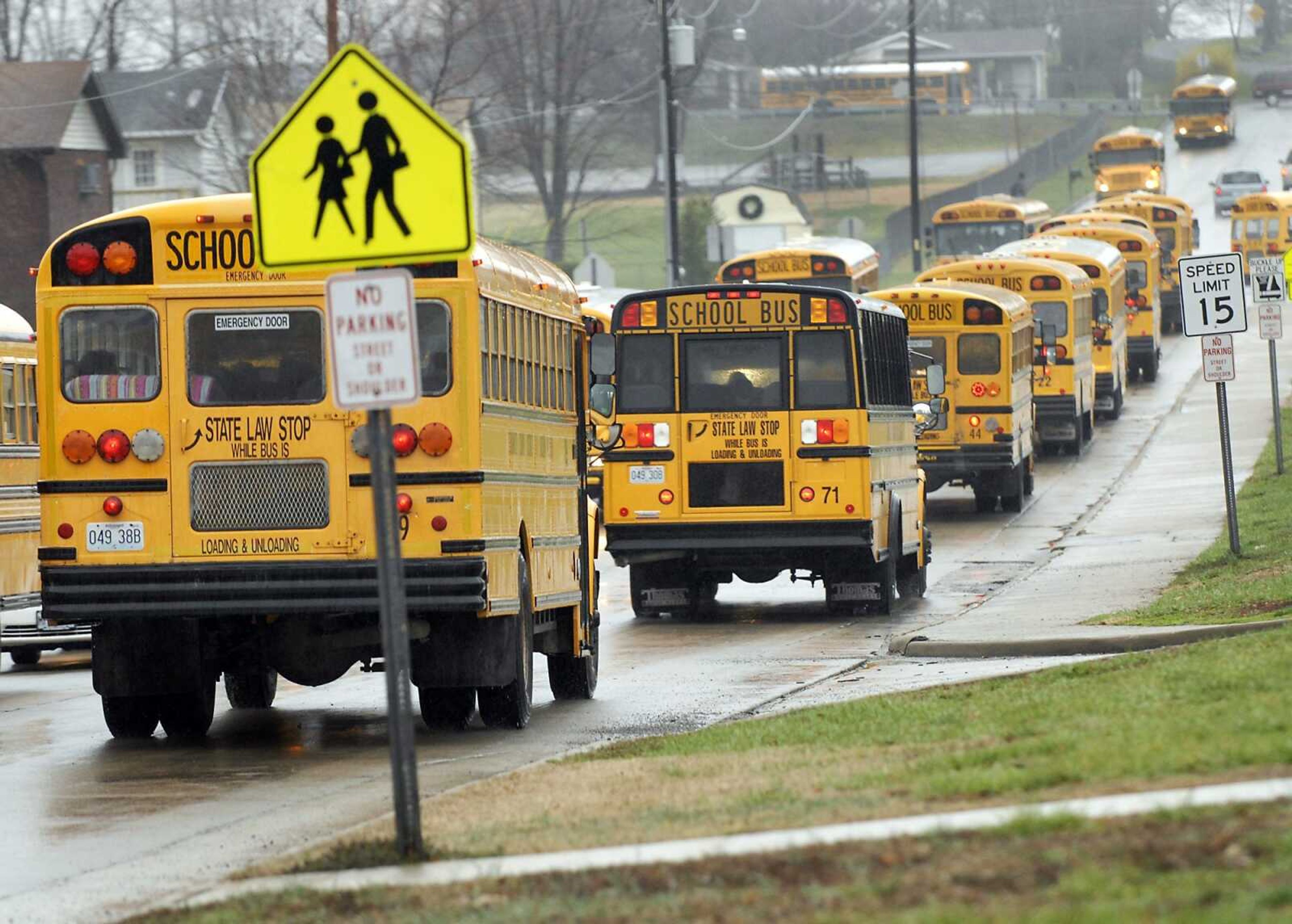Higher fuel prices mean school districts are looking at cutting class trips, changing bus routes and trimming spending elsewhere
It's been a bumpy month for the Oak Ridge School District's transportation budget. Fuel expenditures have doubled over the past month, according to Gerald Landewee, superintendent for the small school district in northwest Cape Girardeau County. Oak Ridge, which operates its own transportation system, spent nearly $20,000 on diesel fuel last month, up from about $9,800 during the same time last year...
It's been a bumpy month for the Oak Ridge School District's transportation budget.
Fuel expenditures have doubled over the past month, according to Gerald Landewee, superintendent for the small school district in northwest Cape Girardeau County.
Oak Ridge, which operates its own transportation system, spent nearly $20,000 on diesel fuel last month, up from about $9,800 during the same time last year.
Diesel prices jumped another 3.7 cents last week to an average price of $3.09 per gallon, the 15th straight week of rising prices. With buses on five routes guzzling as much as 1,300 gallons of diesel every month, Oak Ridge's transportation budget, like so many nationwide, is feeling the pinch.
If the prices keep rising, and all signs point to much higher fuel costs ahead, Landewee said the classroom could pay.
"It could impact the entire budget, everything from the areas of operation and maintenance. It could impact instruction," he said.
School districts across Missouri are changing bus routes, cutting class trips and looking at trimming spending on other budget items to compensate for the increased cost of transportation -- and they're doing it in a time when state transportation funding has been drastically reduced.
"Undoubtedly it's beginning to have an impact," said Brent Ghan, spokesman for the Missouri School Boards' Association. "I don't think our districts anticipated these rapidly rising costs when they were making their budgets for this fiscal year, and we anticipate higher fuel costs for the coming school year as well."
It remains to be seen whether diesel will hit the record levels of $4.75 a gallon posted a few years ago, but sluggish global economic recovery, surging crude prices driven by turmoil in the Middle East and the typical upward price movement in late winter and spring point to more troubling times at the pumps for motorists.
There was some relief earlier this school year for Missouri's public schools. Gov. Jay Nixon put back about $17.5 million into transportation aid for schools, the result of improving state revenue. Nixon also has proposed a slight increase for the next school year. But in July he cut $70 million of the $153 million lawmakers had allocated for school busing, a move, he said, aimed at balancing the budget beneath the weight of presumed declining revenue. The majority of school transportation costs have been shifted to local entities, and when fuel prices rise, the burden becomes more pronounced, Ghan said.
"Whenever districts have to pour money into transportation, that money has to come from somewhere, usually in other areas of the budget," he said.
The Jackson School District, one of the largest geographical districts in the state at 285 square miles, has in recent years streamlined its routes, eliminating some and finding efficiencies wherever possible. Transportation director Carol Woods said the district-run transportation system has spent about half of its $400,000 fuel budget to date.
"We're looking at any way we can save," she said. "We're not taking as many field trips as we had in the past."
Parent/teacher organizations, she said, may pick up some of the costs with more of the late-year elementary school trips.
Fuel costs are a big part of the rising expenses Missouri school districts face as they deal with flat or declining revenue. Don Moore, superintendent of the Kelly School District, said propane and diesel costs for the schools and its buses in recent weeks have topped $16,450. More districts, he said, are dipping into their reserves to help get through budget shortfalls. Kelly's reserves, Moore said, are right at 33 percent, with an annual budget of about $7 million.
"Some are more fortunate than others," he said. "If you have reserves, you try to weather out the storm without cutting your budget."
Oak Ridge last year cut transportation from its summer school program and will do the same this summer, Landewee said -- if the state funds the programming.
Others, like the Scott City School District, have staggered daily start and release schedules to save on buses.
"You cut where you can," Scott City superintendent Diann Bradshaw-Ulmer said. "There are some things you've got to spend money on, and we feel like we need to spend money to get children to school."
mkittle@semissourian.com
388-3627
Pertinent address:
4198 State Hwy E, Oak Ridge, Mo.
614 E. Adams St., Jackson, Mo.
4035 Missouri 77 Benton, MO 63736-9162
Connect with the Southeast Missourian Newsroom:
For corrections to this story or other insights for the editor, click here. To submit a letter to the editor, click here. To learn about the Southeast Missourian’s AI Policy, click here.










